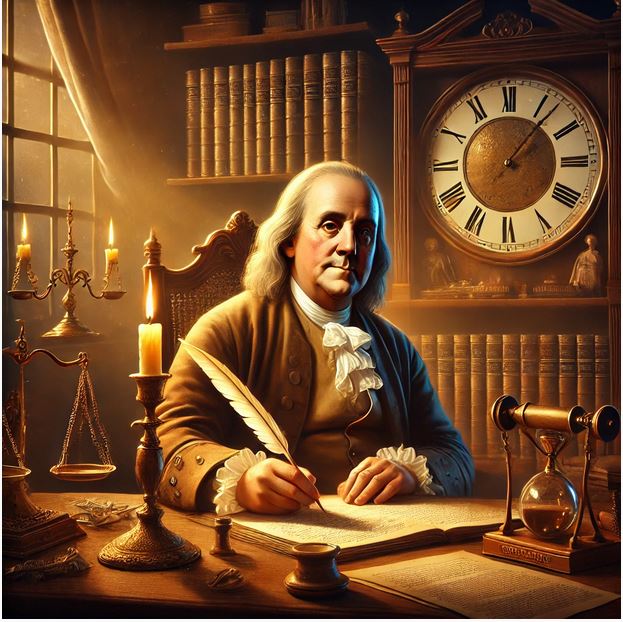Your Cart is Empty
Life lessons I've learned from being inspired by Benjamin Franklin
14 Feb, 2025 18

Life Lessons I've Learned from Being Inspired by Benjamin Franklin
Benjamin Franklin, one of America’s Founding Fathers, was a polymath—an inventor, writer, scientist, diplomat, and philosopher. His contributions to society spanned from the lightning rod to the postal system, from diplomacy to self-improvement. His philosophy of life, encapsulated in his writings and personal practices, continues to offer valuable lessons in productivity, discipline, and wisdom. Over the years, I have drawn inspiration from Franklin’s life and applied many of his principles to my own. Here are the profound life lessons I have learned from him.
1. The Power of Self-Improvement and Habit Formation
Franklin was obsessed with self-improvement. He created a structured system to cultivate virtues he believed were necessary for a successful and meaningful life. His thirteen virtues, including temperance, silence, and frugality, were a framework for moral and personal growth.
One of my greatest takeaways from Franklin is the importance of tracking personal habits. Inspired by his practice, I began maintaining a journal where I document my progress on certain habits I want to develop—whether it's writing daily, practicing gratitude, or waking up early.
2. Time is Our Most Valuable Asset
Franklin famously said, "Dost thou love life? Then do not squander time, for that’s the stuff life is made of." He believed in maximizing every minute of the day and treated time as a precious, non-renewable resource.
From him, I learned to be mindful of how I spend my time. I started scheduling my day with intention, limiting distractions, and focusing on high-impact tasks. His principle of early to bed, early to rise resonated with me deeply, reinforcing the importance of a structured routine.
3. Frugality and Financial Prudence
Franklin was a firm advocate of frugality, not in the sense of deprivation, but as a means to build wealth and stability. His advice, "A penny saved is a penny earned," instilled in me the significance of saving, investing wisely, and avoiding wasteful expenditures.
Adopting Franklin’s philosophy, I began scrutinizing my spending habits, ensuring that I invest in long-term value rather than short-term gratification. His belief in self-sufficiency also encouraged me to develop multiple income streams and financial literacy.
4. Curiosity and Lifelong Learning
Franklin’s voracious appetite for knowledge never ceased. Despite his lack of formal education, he was constantly learning—whether through books, observations, or experimentation.
Inspired by his example, I developed a commitment to continuous learning. I read widely, take online courses, and engage in deep conversations to expand my knowledge. Franklin’s ability to teach himself multiple disciplines, from science to languages, proves that learning never ends.
5. The Importance of Writing and Communication
As a prolific writer, Franklin understood the power of words. His Poor Richard’s Almanack and numerous essays conveyed wisdom in an accessible and humorous way.
I realized the importance of articulating thoughts effectively, which led me to develop a daily writing habit. Whether through journaling, blogging, or public speaking, I strive to communicate ideas with clarity and influence—an ability Franklin mastered.
6. Humility and the Art of Persuasion
Despite his great achievements, Franklin maintained humility and knew that persuasion required tact. He mastered the Socratic method, asking questions rather than imposing opinions, allowing others to reach conclusions on their own.
Following his approach, I have learned to listen more than I speak, ask thought-provoking questions, and persuade through logic and reason rather than confrontation. This skill has helped me in debates, negotiations, and everyday conversations.
7. Community and Contribution
Franklin was a community builder—founding institutions like the American Philosophical Society and the first public library. He believed in civic engagement and giving back.
Taking a cue from him, I sought ways to contribute meaningfully to my community, whether through mentoring, volunteering, or sharing knowledge. He showed that true success is measured not just by personal achievements but by the impact we have on others.
8. Resilience in the Face of Adversity
Franklin’s life was not without setbacks. From business failures to political rivalries, he encountered numerous obstacles. Yet, his resilience and adaptability allowed him to keep moving forward.
Inspired by his example, I have learned to embrace failures as stepping stones rather than roadblocks. His belief that "Energy and persistence conquer all things" has kept me pushing forward even when challenges seem insurmountable.
9. Innovation and Thinking Outside the Box
Franklin’s inventions, from bifocals to the Franklin stove, showcase his innovative mindset. He looked at common problems and found creative solutions.
This has influenced my approach to problem-solving—thinking outside the box, questioning norms, and experimenting with new ideas. Franklin’s inventive spirit reminds me that progress comes from curiosity and action.
10. Diplomacy and Emotional Intelligence
Franklin was a master diplomat, playing a crucial role in securing French support for the American Revolution. His ability to navigate complex relationships with charm and strategy was instrumental in shaping history.
Studying his diplomatic tactics taught me the value of emotional intelligence, patience, and understanding different perspectives. In both personal and professional settings, I now strive to build bridges rather than burn them.
Conclusion
Benjamin Franklin’s life offers an endless source of wisdom. His principles of self-discipline, time management, financial prudence, lifelong learning, humility, resilience, and community service continue to shape my daily life. His legacy proves that a well-rounded, meaningful existence is built on curiosity, perseverance, and a commitment to bettering oneself and society.
By following in Franklin’s footsteps, I strive to live a life that embodies wisdom, action, and purpose—just as he did.




